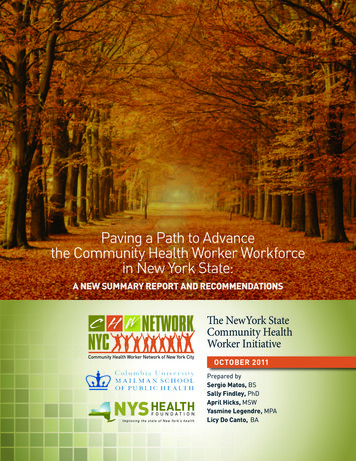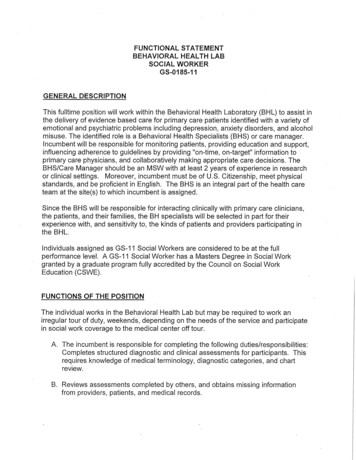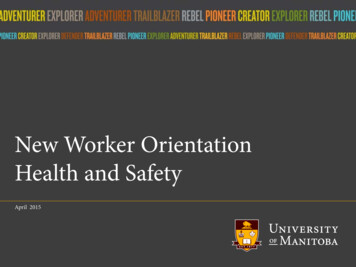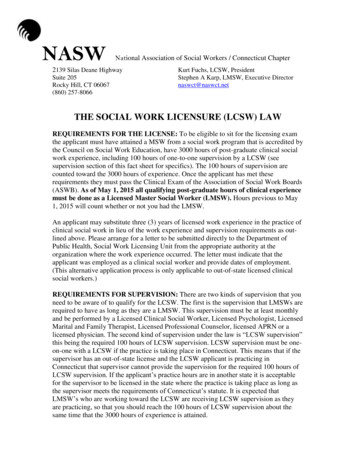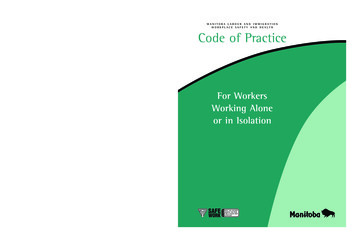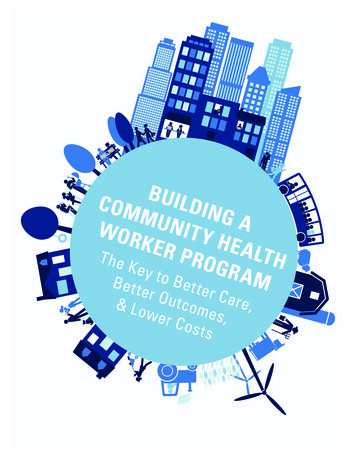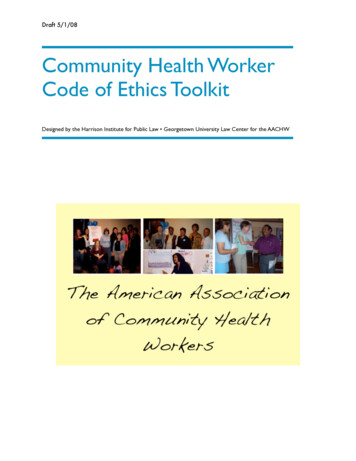
Transcription
Draft 5/1/08Community Health WorkerCode of Ethics ToolkitDesigned by the Harrison Institute for Public Law Georgetown University Law Center for the AACHW
AcknowledgementsThe Community Health Worker Code of Ethics Toolkit was funded by a grant from the RobertWood Johnson Foundation.This toolkit was prepared by Jacqueline Scott and Lauren Dunning of the Harrison Institute forPublic Law at the Georgetown University Law Center, with valuable assistance from member ofthe American Association of Community Health Workers.The Harrison Institute provides services that enable democracy to work. Our clients arepolicymakers – legislators, attorneys general, regulatory agencies – and nonprofit coalitions that promote policy change. As their lawyers, we analyze law-making authority,identify options for changing policy, help our clients plan their strategy, and draft policybased on client choices. Our staff is organized to develop expertise in three areas – healthpolicy, trade policy and utility regulation.
AmericanAssociation ofCommunity HealthWorkersOFFICEHarrison Institute for Public LawGeorgetown University Law Center600 New Jersey Avenue, NWWashington, DC 20001PHONE(202) 662-4229FAX(202) gDear Community Health Worker Organizations,The American Association of Community Health Workers (AACHW) iscommitted to providing support, guidance, and a forum for communication to all community health workers. In service of this mission, theAACHW seeks to enhance the diverse roles community health workers(CHWs) play in the health care field through policy. A significant step thatcan be taken to further the development of the CHW profession is thecreation and adoption of a code of ethics.A code of ethics is important to your organization for the work it can doto support the relationships of CHWs to their employers and communities, as well as among CHWs. The professionalism of CHWs is enhancedby a code of ethics, helping to legitimize the status of CHWs as valuedmembers of health care teams. A code can also offer reassurance to thepublic that CHWs will act properly when faced with ethical dilemmas,essential in fostering the trust necessary to work effectively in communities. Community health workers will benefit from the guidance a code ofethics can offer in solving professional quandaries.The AACHW has adopted a code of ethics for its members, but it is important that regional community health worker organizations ratify theirown codes. There are a number of reasons why it is advantageous foryour organization to craft a custom code. The drafting process can stimulate a dialogue about ethical issues facing community health workers inyour locality, which can lead to a definition of best practices and methodsof improving client service. A code of ethics developed by your organization can foster a sense of ownership over the code, essential for ensuringacceptance of and compliance with the code. Finally, by creating a customcode your organization can tailor the provisions of it to address theneeds of members, resulting in a document that provides more specificguidance to the members of your organization.This toolkit can help your organization develop and adopt a code of ethics specific to your area, or adopt the national code of ethics. A CHWcode of ethics benefits CHW’s and all that work with them. Please takethe time to perform this task that is so essential to the development ofthe profession.Sincerely,The American Association of Community Health WorkersHarrison Institute for Public Law Georgetown University Law Center 1
Community Health WorkerCode of Ethics ToolkitINTRODUCTIONThe Community Health Worker Code of Ethics Toolkit is designed to guide your professionalorganization through the process of adopting a code of ethics for its members. The toolkit isdivided into two sections. The first section offers guidance for adopting the AACHW code of ethics. The second section provides a detailed template for the creation of a code unique to yourorganization.In choosing between adopting the national code or a customized code, it is important to takeinto account the particular needs of your organization. If your organization is new or in theearly stages of development, it may be best to adopt the national code as a starting point. Yourorganization can revisit the toolkit at any time to create a customized code to suit the evolvingidentity of your organization.Creating and adopting a code of ethics requires considerable time investment. If your organization is well-established, the process of developing a custom code can bring together members ofyour organization, facilitating a dialogue about ethics and matters that are important to yourmembers.At this point, a Community Health Worker code of ethics is not legally binding. Members of organizations that adopt codes are morally bound to follow them, but do not face formal consequences, outside of those imposed by state or federal law, if they do not.Harrison Institute for Public Law Georgetown University Law Center 2
Table of ContentsCommunity Health Worker Code of Ethics ToolkitI.Adopting the AACHW Code of EthicsA. GuidanceB. Leadership letterC. Text of the codeII.Adopting a custom code of ethicsA. GuidanceB. Leadership letterC. Instructions for creating a custom code of ethicsD. Creating a custom code of ethicsIII. ResourcesA. Contact list of state organizationsB. Contact list of state attorney general officesIV. Appendix A: About the AACHWA. AACHW Vision, Mission, and Goal StatementsB. Core Values of Community Health WorkersV.Appendix B: Definition of a Community Health WorkerHarrison Institute for Public Law Georgetown University Law Center 3
I. Adopting the AACHW Codeof EthicsThis section provides guidance for adopting the AACHW code of ethics, as well as the text ofthe code itself.Adopting a code of ethics can encourage meaningful dialogue among CHWs about theday-to-day ethical issues they face.A. GuidanceThere are two important steps that your organization must take in order to successfully adoptthe AACHW Code of Ethics.1. Talk to your members. Education is an essential component to the success of any codeof ethics. Make sure that your members are engaged through meetings and small discussions.Talk about topics such as ethics, liability, and confidentiality. Explain what a code of ethics isand its purpose.2. Vote to formally adopt. Your organization will need to formally adopt the code of ethics. Does your organization have official by-laws? Based on your organization’s rules, hold ameeting to formally vote to adopt the code.Harrison Institute for Public Law Georgetown University Law Center 4
B. Leadership LetterUse this letter to inform your members about the adoption of a code of ethicsDear Members,The is committed to providing support, guidance, and aforum for communication to our members. In service of this mission, our organization has adopted a code of ethics for our members with the help of theAmerican Association of Community Health Workers.Name ofOrganizationOFFICEWork StreetWork City, Work State Work ZIPPHONEWork PhoneFAXWork Fax PhoneEMAILWork EmailWEBWork URLA code of ethics can support the relationships of our members to their employers and communities, as well as foster connections among members. Theprofessionalism of our organization and our members is enhanced by a codeof ethics, helping to legitimize the status of community health workers as valued members of health care teams. A code can offer reassurance to the publicthat community health workers will act properly when faced with ethical dilemmas, essential in cultivating the trust necessary to work effectively incommunities.Members will benefit from the guidance a code of ethics can offer in solvingprofessional quandaries. A code of ethics can also encourage awareness of thelaws and regulations applying to the professional activities of communityhealth workers.The AACHW has adopted a code of ethics for its members, which we havenow adopted as the code of ethics for our members. We hope that the adoption of a code of ethics will stimulate a dialogue about ethical issues facingour members. In the following months we will be reflecting upon the code inour group meetings. Please take the time to participate so that our code ofethics can become an important part of our organization.Sincerely,Harrison Institute for Public Law Georgetown University Law Center 5
C. Community Health Worker Code of EthicsA Community Health Worker (CHW) is a frontline public health worker who is a trustedmember of and/or has an unusually close understanding of the community s/he serves. Thistrusting relationship enables the CHW to serve as a liaison/link/intermediary between health/social services and the community to facilitate access to services and improve the quality andcultural competence of service delivery. A CHW also builds individual and community capacityby increasing health knowledge and self-sufficiency through a range of activities such as outreach, community education, informal counseling, social support, and advocacy.Purpose of this CodeThe Community Health Worker Code of Ethics is based on and supported by the core valuesadopted by the American Association of Community Health Workers. The Code of Ethics outlined in this document provides a framework for Community Health Workers, supervisors, andemployers of Community Health Workers to discuss ethical issues facing the profession. Employers are encouraged to consider this Code when creating Community Health Worker programs. The responsibility of all Community Health Workers is to strive for excellence by providing quality service and the most accurate information available to individuals, families, and communities.The Code of Ethics is based upon commonly understood principals that apply to all professionals within the health and social service fields (e.g. promotion of social justice, positive health, anddignity). The Code, however, does not address all ethical issues facing Community Health Workers and the absence of a rule does not imply that there is no ethical obligation present. As professionals, Community Health Workers are encouraged to reflect on the ethical obligations thatthey have to the communities that they serve, and to share these reflections with others.Article 1. Responsibilities in the Delivery of CareCommunity Health Workers build trust and community capacity by improving the health andsocial welfare of the clients they serve. When a conflict arises among individuals, groups, agencies, or institutions, Community Health Workers should consider all issues and give priority tothose that promote the wellness and quality of living for the individual/client. The following provisions promote the professional integrity of Community Health Workers.1.1 HonestyCommunity Health Workers are professionals that strive to ensure the best health outcomes for the communities they serve. They communicate the potential benefits andconsequences of available services, including the programs they are employed under.Harrison Institute for Public Law Georgetown University Law Center 6
1.2 ConfidentialityCommunity Health Workers respect the confidentiality, privacy, and trust of individuals,families, and communities that they serve. They understand and abide by employer policies, as well as state and federal confidentiality laws, that are relevant to their work.1.3 Scope of Ability and TrainingCommunity Health Workers are truthful about qualifications, competencies, and limitations on the services they may provide, and should not misrepresent qualifications orcompetencies to individuals, families, communities, or employers.1.4 Quality of CareCommunity Health Workers strive to provide high quality service to individuals, families,and communities. They do this through continued education, training, and an obligationto ensure the information they provide is up to date and accurate.1.5 Referral to Appropriate ServicesCommunity Health Workers acknowledge when client issues are outside of their scopeof practice and refer clients to the appropriate health, wellness, or social support services when necessary.1.6 Legal ObligationsCommunity Health Workers have an obligation to report actual or potential harm toindividuals within the communities they serve to the appropriate authorities. Additionally,Community Health Workers have a responsibility to follow requirements set by states,the federal government, and/or their employing organizations. Responsibility to thelarger society or specific legal obligations may supersede the loyalty owed to individualcommunity members.Article 2. Promotion of Equitable RelationshipsCommunity Health Workers focus their efforts on the well-being of the whole community. Theyvalue and respect the expertise and knowledge that each community member possesses. Inturn, Community Health Workers strive to create equitable partnerships with communities toaddress all issues of health and well-being.2.1 Cultural HumilityCommunity Health Workers possess expertise in the communities in which they serve.They maintain a high degree of humility and respect for the cultural diversity within eachcommunity. As advocates for their communities, Community Health Workers have anobligation to inform employers and others when policies and procedures will offend orharm communities, or are ineffective within the communities where they work.Harrison Institute for Public Law Georgetown University Law Center 7
2.2 Maintaining the Trust of the CommunityCommunity Health Workers are often members of their communities and their effectiveness in providing services derives from the trust placed in them by members of thesecommunities. Community Health Workers do not act in ways that could jeopardize thetrust placed in them by the communities they serve.2.3 Respect for Human RightsCommunity Health Workers respect the human rights of those they serve, advance principles of self-determination, and promote equitable relationships with all communities.2.4 Anti-DiscriminationCommunity Health Workers do not discriminate against any person or group on the basis of race, ethnicity, gender, sexual orientation, age, religion, social status, disability, orimmigration status.2.5 Client RelationshipsCommunity Health Workers maintain professional relationships with clients. They establish, respect, and actively maintain personal boundaries between them and their clients.Article 3. Interactions with Other Service ProvidersCommunity Health Workers maintain professional partnerships with other service providers inorder to serve the community effectively.3.1 CooperationCommunity Health Workers place the well-being of those they serve above personaldisagreements and work cooperatively with any other person or organization dedicatedto helping provide care to those in need.3.2 ConductCommunity Health Workers promote integrity in the delivery of health and social services. They respect the rights, dignity, and worth of all people and have an ethical obligation to report any inappropriate behavior (e.g. sexual harassment, racial discrimination,etc.) to the proper authority.3.3 Self-PresentationCommunity Health Workers are truthful and forthright in presenting their backgroundand training to other service providers.Harrison Institute for Public Law Georgetown University Law Center 8
Article 4. Professional Rights and ResponsibilitiesThe Community Health Worker profession is dedicated to excellence in the practice of promoting well-being in communities. Guided by common values, Community Health Workers havethe responsibility to uphold the principles and integrity of the profession as they assist familiesto make decisions impacting their well-being. Community Health Workers embrace individual,family, and community strengths and build upon them to increase community capacity.4.1 Continuing EducationCommunity Health Workers should remain up-to-date on any developments that substantially affect their ability to competently render services. Community Health Workersstrive to expand their professional knowledge base and competencies through educationand participation in professional organizations.4.2 Advocacy for Change in Law and PolicyCommunity Health Workers are advocates for change and work on impacting policiesthat promote social justice and hold systems accountable for being responsive to communities. Policies that advance public health and well-being enable Community HealthWorkers to provide better care for the communities they serve.4.3 Enhance Community CapacityCommunity Health Workers help individuals and communities move towardself-sufficiency in order to promote the creation of opportunities and resources thatsupport their autonomy.4.4 Wellness and SafetyCommunity Health Workers are sensitive to their own personal well-being (physical,mental, and spiritual health) and strive to maintain a safe environment for themselves andthe communities they serve.4.5 Loyalty to the ProfessionCommunity Health Workers are loyal to the profession and aim to advance the effortsof other Community Health Workers worldwide.4.6 Advocacy for the ProfessionCommunity Health Workers are advocates for the profession. They are members, leaders, and active participants in local, state, and national professional organizations.4.7 Recognition of OthersCommunity Health Workers give recognition to others for their professional contributions and achievements.Harrison Institute for Public Law Georgetown University Law Center 9
II. Adopting a Custom Code ofEthicsThis section will guide your organization through the process of creating a code of ethics that isunique to your organization, using the AACHW Code of Ethics as a guide.Creating custom code of ethics can bring together members of your organization.Harrison Institute for Public Law Georgetown University Law Center 10
A. GuidanceThere are important steps that your organization must take in order to successfully draft andadopt a code of ethics.1. Create a committee. In order for drafting to be manageable, a small group should be responsible for the code of ethics. Make sure that the committee creates a way for all membersto communicate their input for the code of ethics. Periodically present the in-progress codefor comment from the entire organization.2. Develop a Plan. Creating a code of ethics is an in-depth process that can take quite awhile to complete. Make a work plan outlining the steps your organization needs to take tomove from the beginning of the project to the completion of the code. Develop a timeline tohelp the project maintain momentum and to give your organization time to make a calendarof meetings to present the progress of the code.3. Talk to your members. Education is an essential component to the success of any codeof ethics. Make sure that your members are engaged through meetings and small discussions.Talk about topics such as ethics, liability, and confidentiality. Explain what a code of ethics isand its purpose.4. Vote to formally adopt. Your organization will need to formally adopt the code of ethics. Does your organization have official by-laws? Based on your organization’s rules, hold ameeting to formally vote to adopt the code.Harrison Institute for Public Law Georgetown University Law Center 11
B. Leadership LetterThis section provides assistance for writing a leadership letter informing your membersabout the creation and plans for adoption of a code of ethics for your organizationA leadership letter should inform members of your organization about your organization’s plans to create and adopt a code of ethics. A successful leadership letter should include:1. An introduction describing the content of the letter.2. An explanation of the importance of a code of ethics to your organization.3. A description of how a code of ethics can benefit members.4. A list of reasons why adopting a custom code of ethics is important to your organization.5. A closing that asks for the input of members. In this section of the letter it would be advantageous to include dates of meetings or conference calls where your organization’s members cancontribute to the content of the code of ethics, as well as other ways they can participate, suchas by email.Harrison Institute for Public Law Georgetown University Law Center 12
Leadership Letter Example FormDear Members,The is committed to providing support, guidance, and aforum for communication to our members. In service of this mission, our organization is creating a code of ethics for our members with the help of theAmerican Association of Community Health Workers.Name ofOrganizationOFFICEWork StreetWork City, Work State Work ZIPPHONEWork PhoneFAXWork Fax PhoneEMAILWork EmailWEBWork URLA code of ethics can support the relationships of our members to their employers and communities, as well as foster connections among members. Theprofessionalism of our organization and our members is enhanced by a codeof ethics, helping to legitimize the status of community health workers as valued members of health care teams. A code can also offer reassurance to thepublic that community health workers will act properly when faced with ethical dilemmas, essential in cultivating the trust necessary to work effectively incommunities.Members will benefit from the guidance a code of ethics can offer in solvingprofessional quandaries. A code of ethics can also encourage awareness of thelaws and regulations applying to the professional activities of communityhealth workers.The AACHW has adopted a code of ethics for its members, but it is important that we create our own code that addresses the particular needs of ourmembers. We can use the drafting process to stimulate a dialogue about ethical issues facing our members. Our own code of ethics can then include provisions that address any unique situations faced by our members.In the following months we will be working to draft the code of ethics for ourorganization. There will be a number of opportunities for you to voice yourinput. Please take the time to participate so that our code of ethics truly represents our members.Sincerely,The Policy Committee ofHarrison Institute for Public Law Georgetown University Law Center 13
C. Instructions for Creating a Custom Code of EthicsIn the following section, provisions of the code are marked with a flag to help guide the creationof your code of ethics. The color of the flag conveys information about the provision and aidsyour organization in making drafting choices. Some flags are also marked with a blue star, indicating that the AACHW believes the provision involves essential core values of the profession.A green flag indicates that a provision has a high level of flexibility. Yourorganization can choose to use their own language to describe the coreethical value, use some of the language provided and create some of yourown, or choose not to include the provision at all.A yellow flag indicates that a provision is especially important to a complete code. Its inclusion is highly recommended, but the language of theprovision can be rewritten to reflect the unique character of your organization.A red flag indicates that a provision is an extremely important element ofa complete code and should be a part of your organization’s code of ethics. A provision marked with a red flag contains essential information foryour organization and its members to reflect upon.A star within any color flag indicates that a provision contains informationthat the AACHW believes is especially important to any code of ethics.Provisions marked with a star reflect core values of the AACHW.Harrison Institute for Public Law Georgetown University Law Center 14
D. Creating a Custom Code of EthicsA Community Health Worker (CHW) is a frontline public health worker who is atrusted member of and/or has an unusually close understanding of the community s/he serves. This trusting relationship enables the CHW to serve as a liaison/link/intermediary between health/social services and the community to facilitate accessto services and improve the quality and cultural competence of service delivery. ACHW also builds individual and community capacity by increasing health knowledgeand self-sufficiency through a range of activities such as outreach, community education, informal counseling, social support, and advocacy.In order to help other health care professionals, employers, and communities becomemore familiar with the work of CHWs, the AACHW suggests that this definition of aCHW, which has been filed with the U.S. Labor Department, is used in your code.Purpose of this CodeThe Community Health Worker Code of Ethics is based on and supported by thecore values adopted by the American Association of Community Health Workers.The Code of Ethics outlined in this document provides a framework for CommunityHealth Workers, supervisors, and employers of Community Health Workers to discuss ethical issues facing the profession. Employers are encouraged to consider thisCode when creating Community Health Worker programs. The responsibility of allCommunity Health Workers is to strive for excellence by providing quality serviceand the most accurate information available to individuals, families, and communities.The Code of Ethics is based upon commonly understood principals that apply to allprofessionals within the health and social service fields (e.g. promotion of social justice, positive health, and dignity). The Code, however, does not address all ethical issues facing Community Health Workers and the absence of a rule does not implythat there is no ethical obligation present. As professionals, Community HealthWorkers are encouraged to reflect on the ethical obligations that they have to thecommunities that they serve, and to share these reflections with others.ARTICLE 1. RESPONSIBILITIES IN THE DELIVERY OF CARECommunity Health Workers build trust and community capacity by improving thehealth and social welfare of the clients they serve. When a conflict arises among individuals, groups, agencies, or institutions, Community Health Workers should considerall issues and give priority to those that promote the wellness and quality of living forthe individual/client. The following provisions promote the professional integrity ofCommunity Health Workers.Harrison Institute for Public Law Georgetown University Law Center 15
1.1 HonestyCommunity Health Workers are professionals that strive to ensure the best healthoutcomes for the communities they serve. They communicate the potential benefitsand consequences of available services, including the programs they are employedunder.1.2 ConfidentialityCommunity Health Workers respect the confidentiality, privacy, and trust of individuals, families, and communities that they serve. They understand and abide by employer policies, as well as state and federal confidentiality laws, that are relevant totheir work.Laws about confidentiality not only require Community Health Workers to keep someinformation private, but also outline when it must not be kept confidential and should bereported. The state attorney general’s office can provide more information about the lawsof your state. The contact information for the office in your state is available in SectionIII of this document.1.3 Scope of Ability and TrainingCommunity Health Workers are truthful about qualifications, competencies, and limitations on the services they may provide, and should not misrepresent qualificationsor competencies to individuals, families, communities, or employers.Community Health Workers have scopes of practice based on their different jobs, education, and training. There are laws that circumscribe the types of care that CommunityHealth Workers can give based on their scopes. The attorney general’s office in your stateis a good source for information about the laws of your state.1.4 Quality of CareCommunity Health Workers strive to provide high quality service to individuals, families, and communities. They do this through continued education, training, and an obligation to ensure the information they provide is up to date and accurate.Community Health Workers have an obligation to provide competent service and information to their clients that reflects accepted medical knowledge and practice. Your organization can find out more about the duties of the profession by contacting the stateattorney general’s office. This provision has information in common with provision 4.1Continuing Education.Harrison Institute for Public Law Georgetown University Law Center 16
1.5 Referral to Appropriate ServicesCommunity Health Workers acknowledge when client issues are outside of theirscope of practice and refer clients to the appropriate health, wellness, or social support services when necessary.Community Health Workers can face tough choices when they fear a client may not receive proper medical care, but they must adhere to their scope of practice and refer patients to the appropriate services when necessary. Information about the obligations ofCommunity Health Workers to refer their clients to other services is available from theattorney general’s office in your state.1.6 Legal ObligationsCommunity Health Workers have an obligation to report actual or potential harm toothers within the communities they serve to the appropriate authorities. Additionally Community Health Workers have a responsibility to follow legal regulations setforth by the state and or their employing organization. Responsibility to the largersociety or specific legal obligation may supersede the loyalty owed to individualcommunity members.There are laws in your state that can require Community Heal
reach, community education, informal counseling, social support, and advocacy. Purpose of this Code The Community Health Worker Code of Ethics is based on and supported by the core values adopted by the American Association of Community Health Workers. The Code of Ethics out-
